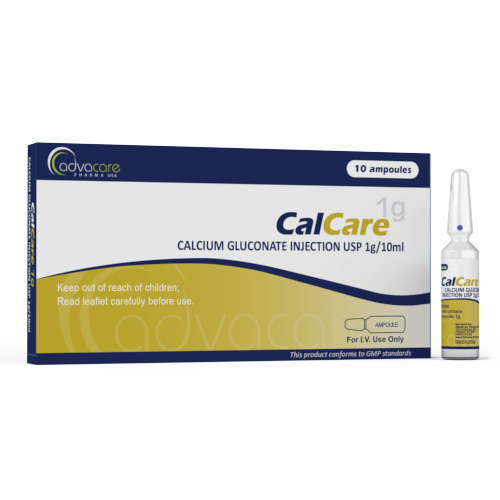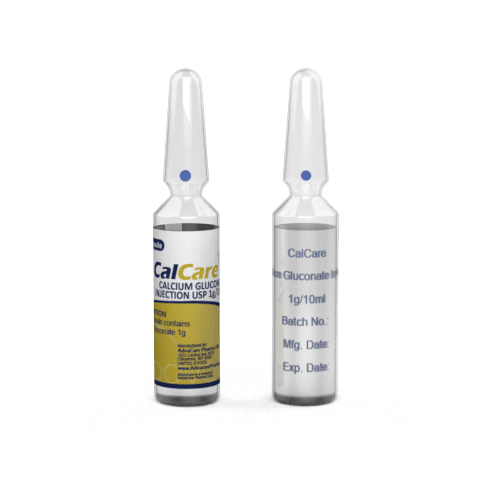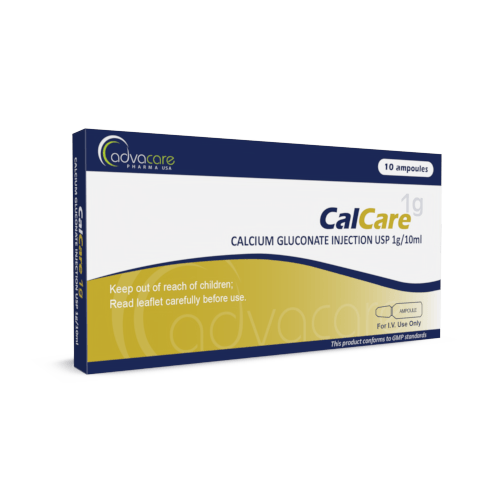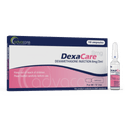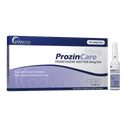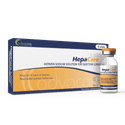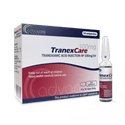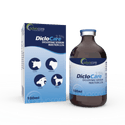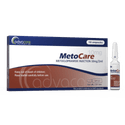- Home›
- Pharmaceuticals›
- Injections›
- Small Volume Injections›
- Calcium Gluconate Injection
Calcium Gluconate Injection
Dosage
Packaging
What is Calcium Gluconate?
Active Ingredients: Calcium Gluconate
Calcium Gluconate Injection is used to treat conditions caused by too little calcium in the body. It is indicated in the treatment of hypocalcemic tetany and hypocalcemia associated with hypoparathyroidism, rapid growth, or pregnancy. It is sometimes used to decrease capillary permeability.
This medication is occasionally used as an adjuvant in the treatment of rickets, osteomalacia, lead colic, magnesium overdose, or black widow spider bites. Intravenous calcium gluconate is typically reserved for emergency treatment and is not suitable for long-term treatment.
Calcium gluconate is the calcium salt of gluconic acid, which is an oxidation product of glucose. It is a mineral that contains 9.3% calcium (about one-third of the calcium that is in calcium chloride). Calcium is an essential component of bones and teeth, and it is essential for many physiological processes within the body, including muscle contraction and neurotransmission.
Intravenous calcium gluconate is often preferred over calcium chloride due to its lower risk of tissue necrosis.
AdvaCare is a GMP-certified producer and supplier of Calcium Gluconate Injections. This medication is manufactured in our factories in China, India, and the USA. We routinely inspect our manufacturing facilities to ensure our products meet quality and safety standards.
Why are we a leading Calcium Gluconate manufacturer?
AdvaCare Pharma, a US-owned pharmaceutical company, is a manufacturer of Calcium Gluconate Injection with GMP-compliant manufacturing facilities located worldwide. We conduct frequent GMP, third-party and internal facility inspections to ensure that our manufactured injectable treatments exceed the stringent requirements of importing countries and our distributors.
As a renown Calcium Gluconate manufacturer and global supplier of 120+ pharmaceutical injection products, our global reach extends to over 65 markets ensuring that pharmaceutical distributors, hospitals, pharmacies, NGOs and government institutions receive the quality-assured treatments they need.
Uses
What is Calcium Gluconate used for?
It is used to treat:
- hypocalcemic tetany
- hypocalcemia associated with hypoparathyroidism
- hypocalcemia due to pregnancy or rapid growth
Calcium gluconate is sometimes used as an adjuvant in the treatment of:
- rickets
- osteomalacia
- lead colic
- magnesium overdose
- black widow spider bites
It is occasionally administered to help decrease capillary permeability associated with various conditions like nonthrombocytopenic purpura, allergic conditions, and certain drug-related exudative dermatoses.
What is the difference between Calcium Gluconate Injection and Calcium Chloride Injection?
Calcium Gluconate Injection has a lower concentration of elemental calcium than Calcium Chloride Injection, which means that a larger volume of the solution is necessary to deliver the same amount of calcium as calcium chloride. This is more suitable for less severe hypocalcemia, during total parenteral nutrition (TPN), or for situations requiring a lower risk of tissue irritation. Calcium Chloride Injections are typically used when a rapid increase in blood calcium levels is needed, as in severe hypocalcemia with cardiac arrhythmia.
How are Calcium Gluconate Injections used?
This medication is manufactured as a solution to be injected into a vein. It should be administered by a healthcare professional in a hospital or clinic setting. Before administration, it is ideal to warm the solution to body temperature. If discomfort or adverse effects appear, the injection should be stopped until the symptoms subside before resuming therapy. Rapid infusion has been associated with symptoms such as hypotension, bradycardia, syncope, cardiac arrhythmias, vasodilation, or cardiac arrest.
Calcium gluconate should never be injected into tissues, as necrosis or sloughing may occur.
What are the signs of an overdose of Calcium Gluconate?
Excessive amounts of this medicine may result in hypercalcemia. Some symptoms of overdose at lower levels include confusion, weakness, fatigue, and depression. At higher levels, symptoms include hallucinations, hypotonicity, seizure, and coma. Symptoms will typically appear when the total serum calcium concentration is ≥ 12mg/dL.
What dose should be given?
Adult Dosing Recommended dosage may vary based on different medical conditions:
- For emergent hypocalcemia, the usual dose for adults is 1-2g, given by IV every 6 hours, as needed. The initial dose of 1-2g should be administered over 5-10 minutes. The maximum rate is 200mg per minute, and the maximum dosage per day is 15g. Alternatively, a dose of 5.4-21.5mg/kg per hour can be administered by IV infusion.
- For transfusion-associated hypocalcemia, the usual dose is 1-2g, given by IV with every 500mL of citrated blood.
- For life-threatening arrhythmia associated with hypocalcemia, hyperkalemia, or hypermagnesemia, the usual dose is 1.5-3g, given by IV every 2-5 minutes as needed. The maximum rate is 200mg per minute, and up to 3g per episode can be administered.
- For the adjunct treatment of hypermagnesemia due to CNS depression, the usual dose is 1-2g given once by IV. The maximum rate is 200mg/min.
- For calcium channel blocker overdose, the usual dose is 3-6g, given by IV over 10 minutes. The dose can be repeated as needed every 20 minutes up to 5 times.
Pediatric Dosing For emergent hypocalcemia, the usual dose is as follows:
- under 1 month old: 100-200mg/kg per dose, given by IV every 6 hours as needed. The starting dose should be 100-200mg/kg administered over 5-10 minutes. The maximum rate is 100mg/min. Alternatively, 17-33mg/kg per hour can be administered by IV infusions.
- over 1 month old: 29-60mg/kg per dose given by IV every 6 hours as needed. The starting dose should be 29-60mg/kg, given by IV over 5-10 minutes. The maximum rate is 100mg/min. Alternatively, 8-13mg/kg per hour can be administered by IV infusions.
For life-threatening arrhythmia associated with hypocalcemia, hyperkalemia, or hypermagnesemia in infants and children, the usual dose is 60-100mg/kg per dose, given by IV/IO every 10 minutes, as needed. The maximum rate is 100mg/min. The maximum dosage is 800mg/dose and 3g per episode.
For calcium channel blocker overdose, the usual dose is 60mg/kg per dose, given by IV over 10 minutes. The dose can be repeated every 20 minutes for up to 5 times, as needed.
For cardiac arrest associated with hyperkalemia, hypocalcemia, or hypermagnesemia, the usual dose is 1.5-3g given by IV over 2-5 minutes.
The dosage is based on medical condition, response to the treatment, age, and weight. Refer to a doctor or healthcare professional for guidelines on the exact dosage.
Note on dosage: For an intravenous solution containing 10% calcium gluconate, there is 100mg/mL, or elemental calcium 0.465mEq/mL.
Who can use Calcium Gluconate?
Calcium Gluconate Injections can be given to adults and children, but caution is advised for specific groups of patients.
Pregnant Calcium gluconate is considered safe to use for pregnant women if the benefits outweigh the risks. There are no known risks of infant harm.
Breastfeeding Calcium gluconate is considered safe to use for breastfeeding women if the benefits outweigh the risks. It is known that calcium is excreted in milk. Though there is no human data available, the risk of harm is not expected. No human data is available on the effects of lactation.
Children This medicine is safe for use in children younger than 18, though it should not be used for long-term treatment due to the risk of aluminum toxicity.
Geriatric Elderly patients should start with the lowest possible dose during treatment.
Other warnings
For severe cases of hypocalcemia (ionized calcium < 1mmol/L), it is recommended to monitor serum calcium every 4-6 hours.
For patients with renal impairment, the lowest possible dose should be used. Serum calcium levels should be monitored every 4 hours.
Dose adjustments may not be necessary for patients with hepatic impairment.
Side Effects
As with all pharmaceuticals, some unwanted effects can occur from the use of Calcium Gluconate Injection.
Common side effects include, but may not be limited to:
- tingling or heavy feeling
- chalky taste in the mouth
- thirst
- vomiting or nausea
- constipation or excessive gas
- changes in urination
- irritation near the injection site
Serious side effects that should be reported to medical staff may include:
- signs of an allergic reaction
- problems with urination
- rapid weight gain
- arrhythmia
- lightheadedness
- hypercalcemia
For a comprehensive understanding of all potential side effects, consult a medical professional.
If any symptoms persist or worsen, or you notice any other symptoms, please call your doctor.
Precautions
Do NOT use Calcium Gluconate Injection if:
- You are allergic to calcium gluconate or any other ingredient.
- You have hypercalcemia or sarcoidosis.
- You have ventricular fibrillation.
Before treatment, consult your doctor regarding any medications you are taking to address potential drug interactions.Some known interactions include other forms of calcium, baloxavir marboxil, digoxin, and certain antibiotics (e.g. oxytetracycline, tetracycline). This is not a complete list.
Injections of calcium gluconate injection should not be given to premature neonates (28 days or younger) who are also receiving ceftriaxone.
This product is a supersaturated solution. It should not be combined with compounds like carbonates, phosphates, sulfates, or tartrate in parenteral mixtures in order to avoid precipitation.
Calcium Gluconate Injection should not be mixed with minocycline, as calcium renders this drug inactive.
This medication may not be suitable for people with certain conditions, so it is important to consult with a doctor if you have any health conditions. Alternative dosing, monitoring, or other considerations may be necessary for patients with certain conditions, including cardiovascular disease, renal impairment, hepatic impairment, acidosis, cancer, or a history of renal calculi. Parenteral calcium gluconate is contraindicated in the treatment of hypercalcemia, hypophosphatemia, ventricular fibrillation, or digitalis toxicity.
This solution of calcium gluconate may contain aluminum. It is important to monitor patients with hepatic impairment, as their aluminum levels could reach toxicity.
References
Hypocalcemic tetany associated with simultaneous administration of cimetidine and nifedipine: a case report
Acute hypocalcemia is caused by a sudden drop in serum calcium ions and presents with a mild or severe form of tetany.
This study discusses a case of severe hypocalcemic tetany during the simultaneous administration of cimetidine and nifedipine in a hypertensive patient with dyspepsia. This patient had HIV and received antiretroviral therapy for 14 years, but she had acute exacerbation of dyspepsia and hypertensive urgency. She received cimetidine and nifedipine simultaneously and after 1 hour she developed a hypocalcemic tetany with severe spasms. Immediate calcium gluconate was given intravenously and the spasms decreased.
The conclusion is that hypocalcemic tetany can occur with concomitant cimetidine and nifedipine administration but it can be immediately treated with calcium gluconate.

You might be interested in...
Why AdvaCare Pharma?
As an industry leader, we are aware of our responsibility to provide affordable and sustainable solutions to improve healthcare worldwide.
